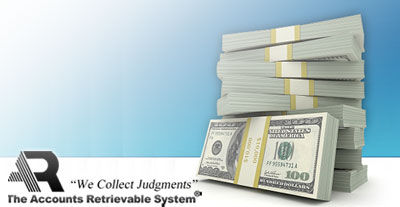
Accounts Retrievable Systems - We Collect Judgements
Judgment recovery is the process of identifying and collecting money or property, or attaching the assets of a debtor after a court has entered an order in favor of a creditor. It covers all activities that the creditor can legally pursue between the time the judgment is entered by the court and when the debt is actually received in hand. A creditor can pursue recovery of the debt himself, or can sell or assign the judgment to a third party that is in the business of judgment recovery or collections.
Courts in most jurisdictions enable a creditor to sue a person who owes him money or property to determine the parameters of the debt and to receive an official declaration, or judgment, of the court. A judgment establishes a creditor’s legal right to redress. A court judgment, however, is just an official announcement that the debt is owed. Courts are not concerned with judgment recovery, and are not involved in the process of collecting money or property for the creditor. In fact, many court judgments are never recovered, because the creditor is solely responsible for the identification of assets and the recovery of the debt, and he may or may not be particularly adept at the process.
Most jurisdictions have laws in place that enable a holder of a judgment to pursue certain means to collect from a debtor. These options typically include garnishment of wages, seizure of bank accounts and other liquid assets, the application of liens to property, eviction, repossession, and forced sale of assets. The creditor is not usually required to pursue these contentious avenues under his sole authority, and can often register the judgment with an officer of the law who would then garnish, seize, evict, repossess, attach, or sell assets of the debtor and remit the money directly to the creditor.
Another popular option for judgment recovery is to sell or assign the judgment to a collection agency or debt recovery service. The recovery business will typically pay the creditor a fraction of what is owed under the judgment if it is sold outright. Although the creditor receives less than the full amount owed, he receives it immediately and can close the book on the matter.
A creditor must make sure that the judgment recovery service that he sells or assigns the debt to is reputable. Most jurisdictions have laws that protect the debtor from harassment and unscrupulous debt collection practices. If a creditor hires a recovery service to act as his agent, the creditor is responsible for all potential violations of the law that the business might commit. If he sells the debt outright, he has to ensure that the transfer of ownership of the debt is properly executed to relieve him of future responsibility.
Article Source: www.wisegeek.com
Call Accounts Retrievable System For More Info at (800) 327-4687
